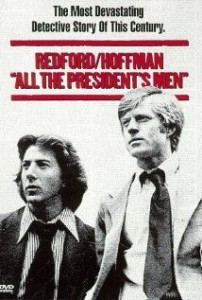All the President’s Men
Posted on December 13, 2002 at 5:17 am
A+| Lowest Recommended Age: | Middle School |
| MPAA Rating: | PG |
| Profanity: | Some very strong language for a PG including the f-word |
| Alcohol/ Drugs: | Drinking and smoking |
| Violence/ Scariness: | Some tense moments |
| Diversity Issues: | None |
| Date Released to Theaters: | 1976 |
| Date Released to DVD: | June 11, 2012 |
| Amazon.com ASIN: | B000CEXEWA |
 This week is the 40th anniversary of the Watergate break-in and a good time to look at the Oscar-winning movie about the two reporters who would not give up on the story of the Watergate break-in, this is as gripping as any detective novel. Bob Woodward (Robert Redford), a junior reporter for the Washington Post, is sent to cover a small-time break-in to the office of the Democratic National Committee (located in the Watergate office building). He works with Carl Bernstein (Dustin Hoffman), another reporter, to find, after tediously painstaking research, that it is just part of a complex pattern of corruption in President Nixon’s re-election campaign.
This week is the 40th anniversary of the Watergate break-in and a good time to look at the Oscar-winning movie about the two reporters who would not give up on the story of the Watergate break-in, this is as gripping as any detective novel. Bob Woodward (Robert Redford), a junior reporter for the Washington Post, is sent to cover a small-time break-in to the office of the Democratic National Committee (located in the Watergate office building). He works with Carl Bernstein (Dustin Hoffman), another reporter, to find, after tediously painstaking research, that it is just part of a complex pattern of corruption in President Nixon’s re-election campaign.
Producer/star Redford was so intent on authenticity he even flew actual garbage from the Washington Post wastepaper baskets out to the set. The movie does a good job of showing how much of the work of the reporters was dull persistence, and it also does a good job of showing us what went in to the decisions of editor Ben Bradlee (Jason Robards in an Oscar – winning performance) and (off-screen) publisher Katharine Graham about what they needed in terms of proof in order to be able to publish the story.
There is an interesting range of moral choices and calibrations. The famous “Deep Throat” (Hal Holbrook), unidentified until 2006, is someone from the inside who will not allow himself to be identified or even quoted, but is willing to confirm what the reporters are able to find elsewhere.
Others involved in the scandal, both in the corruption itself and in its cover-up, must decide what to do and how much to disclose. “Deep Throat” will not tell them anything new, but will confirm what they find out and give them some overall direction, most memorably, “follow the money.” One key development is the decision made by someone identified only as “the bookkeeper” (Jane Alexander) to talk to Bernstein. The participants must also deal with the consequences of their choices. Donald Segretti (Robert Walden) manages to evoke sympathy when what began as juvenile pranks leave him in disgrace. Woodward and Bernstein also make mistakes and must deal with the consequences.
As the movie ends, in 1972, Nixon is re-elected, and it seems to the reporters that their work has had no impact at all. Kids who view this film may need some context in order to understand it, and will want to know what else happened before Nixon resigned in August of 1974.
Families who see this movie should discuss these questions: Why were Woodward and Bernstein the only reporters interested in the story? Why did they insist on two sources before they would publish anything? What were Donald Segretti’s “dirty tricks?” How was he different from Sloan? From the bookkeeper? From Deep Throat? One of the people portrayed in the movie later testified before the Watergate Committee that he had “lost his moral compass.” What does that mean? How does something like that happen? How has technology changed the way that reporters do research and prepare their stories?
Families who enjoy this movie might like to see “The Final Days,” a made- for-television sequel, based on Woodward and Bernstein’s follow-up book. For more on this era, see Nixon with Anthony Hopkins, and Nixon’s famous “Checkers” speech and resignation statement. An odd little movie called Nasty Habits
is an allegory of Watergate, set in a convent, with Glenda Jackson as a Nixonian nun. And a very funny satire, Dick
(for older audiences) sees these events through the premise that it was all uncovered by a couple of high school girls.
If audiences want to know more, they should know that the book this movie was based on is not much fun to read and has more reporting than analysis. Older kids who want to know more can read Breach of Faith: The Fall of Richard Nixon
by Theodore White, To Set the Record Straight: The Break-In, the Tapes, the Conspirators, the Pardon
, by Judge Sirica, or the books by John Dean and H. R. Haldeman. In 2006, the identity of “Deep Throat” was revealed and Woodward told the story in The Secret Man: The Story of Watergate’s Deep Throat
. President Nixon’s series of television interviews with David Frost inspired the Oscar-nominated film Frost/Nixon
, and the interviews
are also available on DVD.
